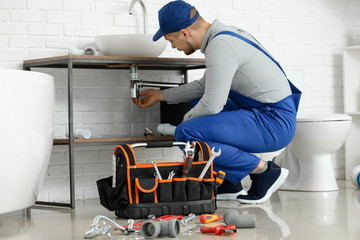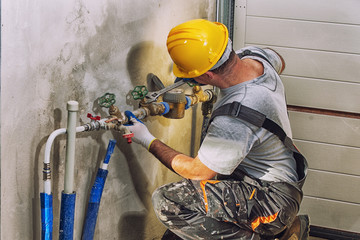Plumber Sarasota plays a vital role in maintaining the functionality of a property’s plumbing system. From fixing leaks to installing new fixtures, their expertise ensures that water flows efficiently. Plumbing issues can disrupt daily life and cause significant damage if left unresolved. Professional plumbers have the skills and tools to address these problems effectively.
Plumbers are trained to handle a variety of plumbing issues, from minor leaks to major pipe bursts. They assess the root cause of the problem and apply the most effective solution. Precision and attention to detail are crucial in plumbing work. A single mistake can lead to costly repairs and water damage.
Clogged drains are one of the most common issues that plumbers address. Accumulated debris, grease, and hair can block water flow and cause backups. Plumbers use specialized equipment to clear blockages and restore normal function. Regular maintenance helps prevent these issues from recurring.
Plumbers also handle pipe installations and replacements. Aging pipes can corrode, leading to leaks and water contamination. Replacing old pipes ensures a clean and reliable water supply. Proper installation techniques prevent future issues and improve water pressure.
Water heaters require expert maintenance and repair. Over time, sediment buildup and wear can reduce efficiency. Plumbers flush the system, replace worn-out parts, and adjust settings for optimal performance. Consistent maintenance extends the lifespan of the unit.
Leak detection is another critical service that plumbers provide. Hidden leaks can lead to mold growth and structural damage. Using advanced tools, plumbers identify the source of leaks without invasive procedures. Early detection saves money and prevents extensive damage.
Plumbers are also responsible for installing and repairing plumbing fixtures. Faucets, sinks, and toilets require proper alignment and secure connections. Improper installation can lead to leaks and operational issues. A professional plumber ensures that all fixtures function correctly.
Sewer line problems are among the most complex issues that plumbers face. Tree roots, debris, and aging pipes can cause blockages and damage. Plumbers use video inspection tools to diagnose the problem accurately. Repairing sewer lines requires precision and specialized equipment.
Gas line installation and repair are also part of a plumber’s expertise. Gas leaks pose a serious safety risk and require immediate attention. Plumbers test for leaks and secure all connections to prevent hazards. Proper gas line maintenance ensures the safety of occupants.
Plumbers are trained to work with both residential and commercial plumbing systems. Commercial buildings often have more complex plumbing networks. High water usage and multiple fixtures require careful planning and maintenance. Professional plumbers ensure that these systems operate efficiently.
Emergency plumbing services are essential in preventing damage during unexpected breakdowns. Burst pipes and overflowing toilets can cause flooding and structural damage. Plumbers respond quickly to minimize the impact of these emergencies. Fast and effective service prevents further complications.
Preventative maintenance is key to avoiding major plumbing issues. Plumbers conduct regular inspections to identify potential problems. Replacing worn-out parts and cleaning drains reduces the risk of breakdowns. Routine maintenance extends the life of the plumbing system.
Plumbing codes and regulations must be followed during all installations and repairs. Professional plumbers are knowledgeable about local codes and compliance requirements. Following these guidelines ensures safety and prevents legal issues. Proper permitting and inspection guarantee a secure system.
Water pressure problems often stem from clogged pipes or faulty fixtures. Plumbers diagnose the cause and make necessary adjustments. Balanced water pressure improves the performance of faucets and appliances. Consistent pressure ensures a comfortable and efficient water supply.
Backflow prevention is an important aspect of plumbing safety. Contaminated water can enter the clean water supply through backflow. Plumbers install and maintain backflow prevention devices. Protecting the water supply ensures safe and clean water for all uses.
Plumbers also work on outdoor plumbing systems. Irrigation systems, outdoor faucets, and drainage systems require proper installation and maintenance. Clogged or damaged outdoor plumbing can cause flooding and water waste. Professional service ensures efficient operation and water conservation.
Frozen pipes are a common problem in colder climates. Water expands when it freezes, causing pipes to burst. Plumbers use insulation and heating techniques to prevent freezing. Quick repairs minimize damage and restore normal water flow.
Drainage issues can cause standing water and property damage. Plumbers install and maintain proper drainage systems to direct water away from structures. Poor drainage can lead to foundation problems and erosion. Effective drainage solutions protect the integrity of the property.
Plumbers are skilled in working with various pipe materials, including copper, PVC, and galvanized steel. Each material has unique properties and installation requirements. Choosing the right material ensures durability and efficiency. Professional knowledge prevents compatibility issues and future leaks.
Water filtration systems are often installed by plumbers to improve water quality. Filters remove contaminants and improve taste. Regular maintenance ensures that the filtration system functions properly. Clean water contributes to better health and appliance longevity.
Plumbers also install and maintain sump pumps to prevent basement flooding. Sump pumps remove excess water from the foundation. Regular testing and maintenance ensure reliable performance. A properly functioning sump pump protects the property from water damage.
Fixture upgrades are common in modern plumbing projects. Water-saving faucets and low-flow toilets reduce water consumption. Plumbers install and adjust these fixtures for maximum efficiency. Upgrading fixtures lowers water bills and supports environmental conservation.
Plumbers also specialize in repiping projects for aging properties. Old pipes may develop cracks and corrosion over time. Complete repiping improves water quality and pressure. Professional repiping ensures a reliable and long-lasting plumbing system.
Water softeners are often installed to address hard water issues. Hard water can cause scale buildup and reduce appliance efficiency. Plumbers install and maintain water softeners to improve water quality. Softened water extends the life of plumbing fixtures and appliances.
Plumbers provide essential services for bathroom and kitchen remodels. Moving or installing new fixtures requires precise pipe placement. Professional installation ensures proper drainage and water supply. Coordinating plumbing with other construction work avoids complications.
Specialized plumbers work with radiant heating systems. These systems use heated water to warm floors and spaces. Proper installation and maintenance ensure consistent performance. Radiant heating increases comfort and energy efficiency.
Greywater systems are becoming more popular for sustainable water use. These systems recycle wastewater for irrigation and other non-potable uses. Plumbers install and maintain greywater systems to maximize efficiency. Proper filtration and routing ensure safe reuse of water.
Water pressure regulators are installed by plumbers to prevent damage from high pressure. Excessive pressure can strain pipes and fixtures. Regulators maintain consistent and safe water pressure. Proper pressure management protects the plumbing system.
Plumbers are also involved in commercial kitchen and laundry installations. High-demand systems require robust plumbing solutions. Professional installation ensures reliable operation and compliance with health codes. Efficient systems support smooth business operations.
Plumbers work closely with construction teams during new building projects. They design and install complete plumbing networks. Proper planning ensures efficient water flow and drainage. A well-designed system reduces maintenance needs and improves longevity.
Solar water heaters are installed and maintained by specialized plumbers. These systems use solar energy to heat water, reducing energy costs. Proper installation maximizes efficiency and reliability. Maintenance ensures consistent hot water supply.
Plumbers also provide inspection services for real estate transactions. Buyers and sellers rely on professional assessments to identify potential issues. Repairing or upgrading plumbing before a sale increases property value. A thorough inspection ensures a smooth transaction.
Rainwater harvesting systems are installed to reduce water consumption. Collected rainwater can be used for irrigation and non-potable needs. Plumbers install and maintain these systems for maximum efficiency. Proper filtration and storage protect water quality.
Plumbing work requires a high level of expertise and precision. Plumbers undergo rigorous training and certification to handle complex systems. Their knowledge ensures that repairs and installations meet industry standards. Reliable plumbing service improves comfort and safety.
Professional plumbers provide long-term solutions for residential and commercial properties. Their work enhances the efficiency and reliability of plumbing systems. Prompt service and proper maintenance prevent costly repairs. Investing in professional plumbing services protects property value and ensures peace of mind.




